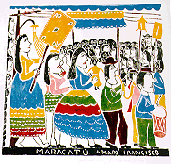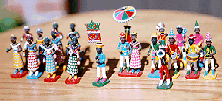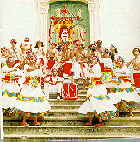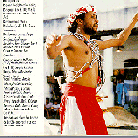 |
Maracatu woodcut from Pernambuco showing the queen, kiug and a woman holding the calunga doll. |
 |
Maracatu woodcut from Pernambuco showing the queen, kiug and a woman holding the calunga doll. |
The maracatu is a carnaval group from Pernambuco, in northeastern Brazil. The groups call themselves nação (nation), for example, Nação do Leão Coroado, (Nation of the Crowned Lion), meaning a large homogeneous group.
The maracatu is composed of a small percussion orchestra with several types of drums, agogô, rattles; women dancers and a male singer. They parade to the rhythm of the drums, wearing beautifully decorated costumes. The soloist sings a song and the chorus of women answers with the refrain. The standard bearer is followed by the king and queen of the maracatu, and the man who carries a large colorful umbrella adorned with fringes symbolizing the sun. The woman in front of the group of dancers carries a doll called the calunga. This doll is supposedly a fetish.
In the maracatus of the countryside, called maracatu rural, there is also the figure of an Indian with a feathered headdress who carries large rattles tied to his back.
 |
Maracatu. Miniature clay figurines by Marliete, Pernambuco, 1984. |
A few years ago this centuries-old tradition - it originated with groups of slaves and ex-slaves more than 300 years ago - seemed to be dying out, slowly disappearing from the carnaval celebrations. But recently, thanks to the efforts of a group called Maracatu Nação Pernambuco, it has made a come back. Their rehearsals in full costume are attended by large crowds who also follow their parades in the cities of Olinda and Recife during the carnaval celebrations.
 |
 |
Cd cover, Maracatu Nação Pernambuco: dancers and lead singer. |
|